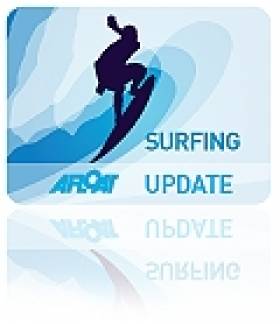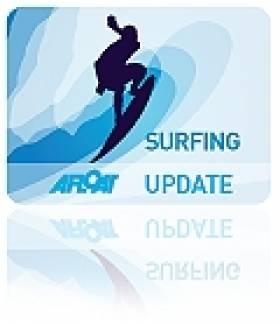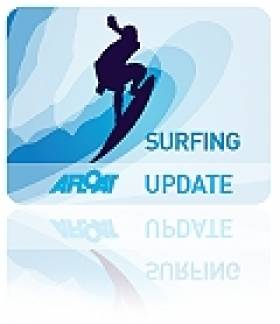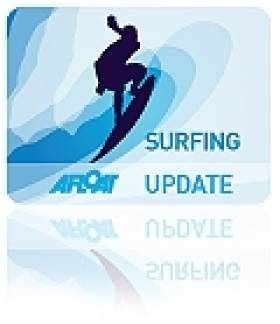Displaying items by tag: Glenn Hall
Champ Lashes Out At Irish Pro After World Surf League Opener
#Surfing - Irish-Aussie surfer Glenn Hall says there's "nothing personal" between him and world surfing champion Gabriel Medina after the latter's outburst over his elimination from the World Surf League season opener.
As the Sydney Morning Herald reports, the Brazilian was seething after an interference call in his heat against Hall confirmed his elimination from the third round.
Medina expressed his frustration at the more than a week spent waiting for suitable waves at Snapper Rocks on Australia's Gold Coast before surfing could even begin.
He also lashed out at Hall for swearing at him in the water - but the New South Wales native dismissed the situation as "a bit of a tight heckle".
Hall, who was born in Australia but competes for Ireland due to his family heritage, is the lone Irish entrant in the new World Surf League, the successor to the ASP World Tour.
Ireland's Hall Knocks Out World Surfing Champ At Rio Pro
#Surfing - Irish surfer Glenn Hall pipped reigning ASP world champion Joel Parkinson for a place in the quarter-finals of the Billabong Rio Pro this week, as Australia's SBS News reports.
Thirty-one-year-old Hall - who was born in New South Wales but has dual citizenship thanks to his Irish grandfather - did not survive much longer himself in the competition at Barra da Tijuca in Brazil, being eliminated in the fifth round by South Africa's Jordy Smith.
But the ASP world tour rookie surprised many with his third-round knockout of the current world champ, who went board-to-board with 11-time champion Kelly Slater for the title last year.
Irish Team in France for Junior Surf Euros
#SURFING - The Irish Junior Surf Team departed yesterday for southwestern France to compete at the 2012 European Junior Surfing Championship at Lacanau-Océan which kicks off tomorrow.
The 19-strong team includes flagbearer Iarom Madden Traver and Cian Cagney in the U18 Boys division, Aaron O'Hare and Gearoid Mc Daid in the U16 Boys and Garbhan Mc Closkey and Dylan Noonan in the U14s Boys.
Ireland will be represented in the U18 Girls by Ayesha Garvey and Rachel Moore, while Eoin O'Malley Daly will compete in the Longboard event.
Meanwhile, Odhran McGovern and Kevin McGowan will challenge for the U18 Bodyboard, Cian McGovern and Oisin Cogan are in the U16 Bodyboards, and Meadb McCloskey is in the field for the U18 Girls Bodyboard.
Among the coaching staff joining the group are Irish Surf Team coach Pascal Devine and top female surf coach Shauna Ward, along with world-class bodyboarder Shane Meehan and U18 reserve Donough Cronin, who will both act as judges.
Heats will commence on Sunday 9 September running throughout the week, with the grand finals to take place the following Sunday 16 September.
The Irish Surfing Assocation has more HERE.
Meanwhile, Ireland's Glenn Hall as knocked out in the round of 16 at the ASP 6-Star San Miguel Pro Zarautz last week.
The Irish surf pro has established some impressive totals throughout the competition in Spain's Basque Country, but even his 13.40 in the fifth round wasn't enough to hold off the challenge of Ramzi Boukhiam, with the Moroccan pipping him by just 0.13 points.
Irish Surfer Takes Mr Price Pro Title in South Africa
#SURFING - Irish surfer Glenn Hall took the top prize at the ASP Prime Mr Price Pro event in South Africa recently.
As AllAfrica.com reports, surfing pro Hall - who was born in Australia - beat Nathaniel Curran from the USA in the final at Willards Beach in Ballito, on the north coast of KwaZulu-Natal provice on the Indian Ocean, to clinch the title.
"It's the biggest win of my career by far," he said. "I kind of felt like if you got the wave out there you could get the score and I was just praying for a wave at the end."
The victory continues a prosperous year for the former ASP Australasian Pro Junior champion, with wins in China and Trestles in California seeing him rise to 16th in the world rankings.
AllAfrica.com has more on the story HERE.



























































